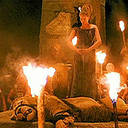
Worldwide the prospects for atheism are being thwarted by the likes of Aslan, the lion and Alister, the Author.
Let’s start with Alister McGrath. From his highly influential position as a professor of historical theology at Oxford, Alister exclaims in his 2004 book, The Twilight of Atheism: The Rise and Fall of Disbelief in the Modern World: “Atheism, once seen as Western culture’s hot date with the future, is now seen as an embarrassing link with a largely discredited past”.
Not coincidentally, in the 2005 October/November issue of Free Inquiry, the influential secularist publication edited by popular atheist Paul Kurtz, contributors from around the world discussed whether unbelief can even survive. Rising religious fundamentalism, post-modernism’s challenges to scientific objectivity, and growing concerns about the role of science in various crises - from militarization to the environment - have put secular humanists on the defensive. Moreover, Harvard University psychologist and atheist Steven Pinker concedes that while atheism has grown in the West, it “has made no inroads in various backward parts of the world.”
As a matter of fact, in the apparent twilight of atheism, the not so backward parts of the world (of which I’m a member) are currently flocking to see the blockbuster movie starring Aslan, Lion of the Tribe of Judah (I highly recommend it). All this because the famous Chronicles of Narnia author C.S. Lewis (1898-1963) began to reconsider his atheism as a young literature professor after reading the works of fantasy writer George MacDonald. The stories “baptized” his imagination, Lewis said. Apparently, as an atheist, Lewis’ imagination lacked true creativity.
Talk about a major blow to atheism, in 1929, Lewis became a theist. “In the Trinity Term of 1929 I gave in, and admitted that God was God, and knelt and prayed,” he wrote. Then, two years later, he converted to Christianity and joined the Church of England. At that moment of his conversion he described himself a “most reluctant convert.” Later in life he wrote a spiritual autobiography, Surprised by Joy (1955).
Joy comes in the morning! Aslan’s risen! He’s risen indeed!
No comments:
Post a Comment